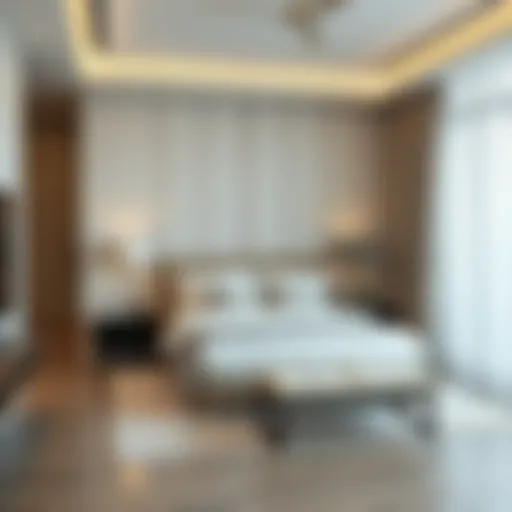Exploring the Emirates of Sharjah: A Comprehensive Overview


Intro
Nestled within the vibrant tapestry of the United Arab Emirates, Sharjah stands out as a unique blend of tradition and modernity. This emirate offers visitors and residents alike a rich cultural scene, historical significance, and a place to experience the wealth of Arab heritage. All these attributes come together to create a destination that hasn't just thrived but flourished in recent years, presenting various investment opportunities and lifestyle choices that can entice anyone looking to settle down or invest in real estate.
Sharjah’s importance goes beyond its historical landmarks like the Sharjah Fort and the Islamic Museum; it captures the essence of Emirati culture. With its diverse population, the emirate demonstrates a unique cosmopolitan spirit, drawing people from numerous backgrounds. Here, one finds a fusion of cultures, languages, and culinary delights that together celebrate the emirate's multicultural essence.
However, beyond its rich history and culture, Sharjah has solidified its position in the regional economic landscape. A well-thought-out development plan has made it an attractive hub for businesses and investors. Economic diversification, robust infrastructure, and strategic positioning add to its potential as a vital center for growth and opportunity.
This article aims to dismantle the components that make Sharjah a prime location for living and investing. From analyzing the current market trends to uncovering promising neighborhoods, each aspect will be thoroughly explored. Whether one is a homebuyer, a seasoned investor, or just curious about Sharjah, the insights presented here will arm you with the information you need to engage meaningfully with this dynamic emirate.
Be ready to dive into the nitty-gritty of the real estate market before we unfold the multifaceted narrative of Sharjah.
Market Insights
Current Market Trends
Understanding the currents that shape the Sharjah real estate market is crucial for anyone thinking about making a purchase or investment. Over the past few years, you might have noticed an upswing in residential and commercial properties, driven primarily by an increase in population and a burgeoning economy. The market is characterized by an influx of new developments tailored for a variety of demographics—from luxury villas to affordable apartments.
One trend that’s worth noting is the increased interest in sustainable living spaces. Developers are increasingly implementing eco-friendly practices to appeal to a growing number of environmentally conscious buyers. Properties featuring sustainable materials, energy-efficient designs, and integrated technology are gaining traction.
Economic Factors Influencing Prices
Several economic factors exert influence on property prices in Sharjah. Firstly, proximity to major highways and commercial districts can elevate the value of real estate, making those areas particularly coveted. Additionally, government initiatives designed to spur job creation have led to increased demand for housing.
Moreover, the recent economic reforms in the UAE have positively impacted investor confidence. Simplifying ownership laws, particularly for expatriates, is a noteworthy development. These moves are geared towards making Sharjah an attractive option for foreign investors, further boosting demand in its real estate market.
"The savvy investor knows that understanding market trends and economic indicators is as vital as the property itself."
Investment Opportunities
High-Yield Neighborhoods
For savvy investors, certain neighborhoods in Sharjah promise higher returns on investment. Locations like Al Reema and Al Majaz are emerging as hotspots due to their strategic locations and modern amenities. These areas not only provide a vibrant lifestyle but also display significant market growth potential.
Some of the suggested neighborhoods to keep an eye on include:
- Al Nahda: Known for its bustling commercial scene, Al Nahda is appealing both for its residential appeal and its proximity to Dubai.
- Al Qasba: Infused with culture, Al Qasba is not just a residential area, but a hub for entertainment and leisure.
Property Types for Investment
When it comes to property types that are particularly rewarding, one can't overlook apartments due to their affordability and growing demand among young professionals. Townhouses and villas also attract families seeking spacious living areas while enjoying a suburban lifestyle.
There is a noticeable demand for mixed-use developments that blend both residential and commercial features, catering to the ease of modern living. The following are key types that potential investors might consider:
- Residential Apartments
- Commercial Spaces
- Luxury Villas
- Land for Development
In summary, Sharjah remains a vibrant and economically viable option for potential investors. With this comprehensive guide, you'll be better equipped to navigate the nuances of the emirate's real estate market, ensuring that your investment decisions are informed ones.
Preface to the Emirate of Sharjah
Sharjah, the third largest emirate in the United Arab Emirates, holds a unique place in the nation’s tapestry. As you embark on a journey through this article, understanding Sharjah is key to grasping its significance, especially in terms of culture, education, and economics. It serves as a bridge between the traditional and the modern, where numerous historical narratives meet rapid development. This makes the emirate not just an appealing location for potential residents, but also a promising ground for investors and developers.
The nuances of Sharjah's societal makeup and its diverse offerings mean there’s more to explore than meets the eye. It’s a place where the heart of the UAE’s artistic endeavors beats strongly, with a heritage that is rich yet intertwined with contemporary aspirations. Specifically, the educational institutions, various industries, and a vibrant cultural scene set Sharjah apart, drawing interest from different corners of the world.
Geographic Overview
Located along the Arabian Gulf, Sharjah boasts a coastline that stretches over 16 kilometers, defining much of its economic and social structure. Geographically, it is surrounded by the emirates of Dubai to the south and Ajman to the north, establishing it as a central hub. The combination of desert landscapes interspersed with lush parks reflects a growing urban sprawl, making it both scenic and functional.
The emirate itself is divided into several regions, each with unique characteristics. The capital city of Sharjah reveals a blend of traditional Emirati life mixed with modern amenities, catering to both locals and expatriates. In addition, notable landmarks such as the Khalid Lagoon and the heritage area provide visitors with glimpses into both the past and the present of this dynamic location. The strategic placement along major trade routes also positions Sharjah well within the global market, impacting its economic ventures.
Historical Background
Sharjah’s history is like a captivating tale where each chapter unfolds with significance. Originally settled as a small fishing village, its evolution is deeply tied to trade routes that traversed the region. Dates can be traced back to over 5,000 years, marking its importance in commerce and culture. The role of pearl diving, once a principal source of income, echoes the emirate’s connection to the sea, forging a relationship that still influences livelihoods today.
Through various periods of conquest and governance, Sharjah has maintained a distinct identity, which is visible in its architecture and local traditions. The emirate has embraced progress while still keeping a watchful eye on its roots. Museums, art galleries, and festivals celebrate the rich Islamic heritage and artistic contributions. This intertwining of the past with the present not only cultivates a sense of pride among residents but also entices visitors who wish to dive deeper into the history that defines this emirate.
"The history of Sharjah is not just recorded in its books but is alive in the voices of its people, each carrying stories that date back centuries."
In summary, Sharjah stands as a testament to resilience and adaptability. An in-depth understanding of its geography and history lays a strong foundation for appreciating its modern-day offerings and investment potential. As we continue through this article, the rich tapestry of Sharjah's demographics, economy, and culture will further come to light.
Demographics of Sharjah
Understanding the demographics of Sharjah is crucial for appreciating its rich social fabric and economic potential. The emirate's population dynamics offer insights into its labor market, cultural influences, and social policies. This section assists investors and homebuyers to grasp the demographic landscape, helping them make informed decisions about residing or investing in the area.
Population Statistics
Sharjah's population has seen steady growth over the years, a testament to its attractivity as a livable and economically vibrant emirate. As of the latest estimates, the population stands at over 1.5 million people. This growth is not just a number but represents diverse communities and a blend of different cultures.
The emirate's increasing population is a key factor in its economic expansion. With a growing workforce, business opportunities thrive, making Sharjah appealing for investors. The population is predominantly composed of expatriates, accounting for a significant portion of the residents. This diversity contributes to a unique cultural landscape, shaping the emirate’s social activities and commercial environments.
Population statistics also reveal the youthfulness of Sharjah’s residents. Approximately 40% of the population is under the age of 30, indicating a vibrant, energetic demographic that drives innovation and economic activities.
This data shouldn't be ignored by potential investors; understanding the age structure helps gauge the demand for housing, educational institutions, and recreational amenities. Generally speaking, regions with younger populations may require more family-oriented housing and educational facilities, influencing market trends significantly.
Cultural Composition
The cultural composition of Sharjah is as varied as the colors in a painter's palette. The emirate is predominantly Arab, with a rich infusion of South Asian, Western, and Southeast Asian cultures, creating a melting pot of traditions and practices. This diversity is most visible during cultural festivals and public holidays, when communities come together to celebrate.
- Arab Influence: Being part of the UAE, Sharjah retains a strong Arab culture that values family, hospitality, and tradition. Arabic is the official language, and most cultural activities emphasize Islamic values.
- Expatriate Communities: The significant expatriate presence means that languages such as English, Urdu, Hindi, and Tagalog are commonly spoken. The influence of these cultures is evident in various aspects, from cuisine to literature and arts.
- Cultural Institutions: Sharjah is home to numerous museums and art galleries, such as the Sharjah Art Museum and the Cultural Palace. These institutions reflect the emirate’s commitment to promoting cultural understanding and appreciation, making it essential for prospective investors and residents to immerse themselves in local heritage.
The emirate also celebrates multiple festivals, such as the Sharjah International Book Fair and the Sharjah Biennial, which not only celebrate local talent but also draw international visitors. This cultural richness enhances the living experience and adds value to real estate, making properties more desirable.
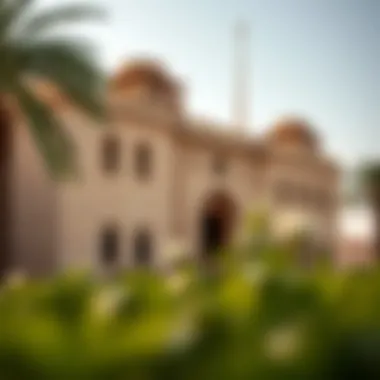
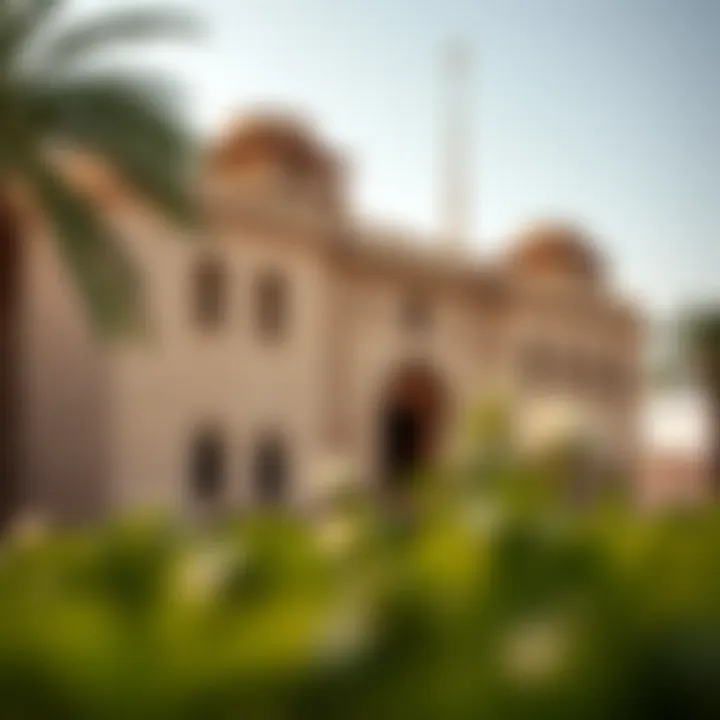
In short, the demographic composition of Sharjah is not merely statistics but reflects a dynamic community with a blend of heritage and modernity. For investors, an understanding of cultural composition can aid in tailoring products and services to meet the varied needs of the population. To further explore demographics in the UAE, consult the Federal Competitiveness and Statistics Authority for detailed reports and statistics.
"A thriving economy thrives on a diverse culture. In Sharjah, tradition meets modernity, creating opportunities for all."
Investors and newcomers should embrace this diversity in their strategies, as community engagement is pivotal for success in real estate and business sectors. By understanding both population statistics and cultural composition, investors can better position themselves within the Sharjah market.
Economic Landscape of Sharjah
The economic landscape of Sharjah plays a vital role in shaping the emirate's identity within the UAE. Positioned strategically alongside Dubai, Sharjah benefits from its unique blend of diverse industries, strong government support, and a conducive environment for growth. This section will take a closer look at the key industries driving Sharjah’s economy and the investment opportunities that arise from this vibrant landscape.
Key Industries
Manufacturing
Manufacturing in Sharjah is a cornerstone of its economic strategy. The emirate is home to over 1,700 manufacturing companies, which together contribute significantly to the GDP. A key characteristic of Sharjah’s manufacturing sector is its diversity, ranging from construction materials to consumer goods. This breadth makes the emirate a hub for innovation and economic resilience.
Moreover, manufacturing here benefits from various government incentives, including tax breaks and streamlined regulations. This creates a favorable environment for both local and foreign investors. However, challenges remain, such as the fluctuating prices of raw materials and the need for constant modernization in technology and processes.
Tourism
Sharjah’s tourism sector has witnessed significant growth and transformation in recent years. The emirate is well-known for its rich cultural heritage and numerous museums, making it a cultural hotspot. Key characteristics of Sharjah’s tourism include its balance between heritage and modernity, promoting family-friendly activities and events.
Visitors frequently seek out attractions like the Sharjah Museum of Islamic Civilization and the Al Noor Mosque, which offer a blend of educational and enlightening experiences. The unique selling point here is Sharjah's commitment to being the cultural capital of the Arab world. However, this focus on culture may sometimes limit its appeal for tourists seeking a more vibrant nightlife.
Despite these potential downsides, the advantages of investing in tourism in Sharjah are significant. The emirate's tourism infrastructure is continually improving, with new hotels and attractions popping up to cater to a growing visitor base. Furthermore, ongoing events like the Sharjah International Book Fair bolster the sector, drawing in thousands annually. In short, the tourism industry is a thriving area with a rich reservoir of opportunities for investors.
Logistics
The logistics sector in Sharjah stands out as a significant driver of the economy, owing to its strategic location and advanced infrastructure. The emirate’s proximity to major trade routes and highly developed ports, notably Saqr Port, enhances its logistical capabilities, making it an indispensable link in the regional supply chain.
One of the key characteristics of Sharjah’s logistics sector is its adaptability to changing market demands. With the booming e-commerce industry, logistics companies in Sharjah have pivoted to offer tailored solutions that cater to online retailers. However, while many logistics firms experience healthy growth, issues like inadequate warehousing space could pose challenges.
The distinctive feature of Sharjah's logistics landscape is the integration of technology in its operations. Many firms are investing heavily in automation and data analytics to streamline their processes. This not only improves efficiency but also positions Sharjah as a forward-thinking logistics hub. Overall, the logistics sector is a formidable part of Sharjah's economy and is poised for continued growth, with ample opportunities for potential investors.
Investment Opportunities
The vibrant economic landscape of Sharjah offers abundant investment opportunities, thanks to its diverse industries and commitment to growth. The government provides numerous incentives and support programs to attract foreign and local investors. For instance, the Sharjah Investment and Development Authority, also known as Shurooq, actively promotes investment in various sectors, including real estate, tourism, and manufacturing.
Cultural and Recreational Aspects
The cultural and recreational landscape of Sharjah is nothing short of captivating. This emirate stands out not only for its rich traditions, but also for its commitment to preserving and promoting its heritage. Understanding this aspect is crucial for potential investors and residents alike. It influences lifestyle choices, community engagement, and even impacts property values in the region. An emphasis on culture fosters a vibrant community spirit, attracting families and expatriates who appreciate diverse experiences.
Cultural Institutions
When it comes to cultural institutions, Sharjah is a veritable treasure trove. The Sharjah Art Foundation, for instance, houses contemporary art exhibitions and projects that resonate not just locally but internationally. The Sharjah Museum of Islamic Civilization offers visitors a chance to delve into Islamic art, history, and culture. These institutions do more than just display art and artifacts; they stimulate dialogue among communities, providing a space for cultural enlightenment.
Moreover, the cultural institutions play a pivotal role in shaping the emirate's identity. They bring both locals and tourists together, offering educational programs that encourage a deep understanding of the region’s cultural heritage. In addition, the museums and galleries are often venues for workshops, lectures, and symposiums, fostering a sense of community.
Festivals and Events
Festivals in Sharjah are a hallmark of its cultural scene. The Sharjah International Book Fair is not merely an event for book lovers, but offers a platform for cultural exchange, showcasing renowned authors from various backgrounds. Likewise, the Sharjah Arts Festival celebrates artistic expression through theater, music, and dance, engaging audiences of all ages.
The Sharjah Light Festival is another significant event, where historical landmarks are illuminated magnificently, drawing crowds from around the UAE. Such events aren't just about entertainment; they promote tourism and local business while enriching the emirate's cultural fabric. Participating in these festivals can give potential investors insight into community values and preferences, which is invaluable when considering property investments.
Outdoor Activities
The outdoor scene in Sharjah is as vibrant as its urban culture. The emirate's geographic diversity offers a range of activities from desert safaris to beach outings. The Al Qasba waterfront, for example, combines relaxation with recreation, featuring cafes, cycling paths, and stunning views.
For those who enjoy more structured activities, the Sharjah Golf and Shooting Club offers facilities for various sports, blending luxury with leisure. Additionally, the emirate boasts several parks and gardens, like Al Majaz Waterfront, providing families with spaces for picnics and social activities.
In essence, the outdoor offerings enhance the quality of life in Sharjah, appealing to potential residents and investors by indicating a healthy, active lifestyle that could foster community connections.
In summary, the cultural and recreational aspects of Sharjah are essential elements that not only enrich the lives of its residents but also play a significant role in the emirate's real estate appeal. Cultural institutions, engaging festivals, and varied outdoor activities are key indicators of a vibrant community that investors should consider for future opportunities.
For further reading on the cultural dynamics of Sharjah, you can explore resources like Sharjah Art Foundation and Visit Sharjah.
Real Estate Market Insights
The real estate sector in Sharjah plays a vital role in shaping its economic landscape. Understanding the dynamics of this market is essential for potential buyers, investors, and developers who are looking to tap into the wealth of opportunities this emirate holds. When considering investments or a new place to call home, grasping the following insights can prove immensely beneficial.
Current Market Trends
As of late, Sharjah's real estate market exhibits several intriguing trends. The emirate has seen a growing interest from expatriates as the affordability of housing options in Sharjah compared to neighboring Emirates makes it an attractive option. Additionally, there’s an uptick in demand for properties that offer sustainable and smart living solutions, as the market shifts toward eco-friendliness and technological integration.
Some specific trends include:
- Affordable Housing: With the rising in population, there’s been a consistent demand for budget-friendly residential options.
- Leisure and Mixed-Use Developments: An inclination towards properties that blend residential, commercial, and recreational spaces is influencing new projects.
- High Yield Investment Properties: Investors are keen on properties that promise high rental returns, especially in thriving areas.
Property Types Available
Residential
Residential real estate in Sharjah comprises a broad spectrum of choices, catering to diverse needs and preferences. From villas to apartments, the distinct characteristics of residential properties make them an appealing option for families and individuals alike. One key characteristic of residential real estate is its range of affordability. This versatility not only aids in attracting a plethora of buyers but also supports the rental market significantly.
A unique feature of residential properties is the variety of layouts and amenities offered, with many developments providing access to community pools, parks, and fitness centers.
However, challenges such as maintaining vibrant neighborhoods while accommodating demographic changes can affect desirability. Still, well-planned residential areas contribute positively to the community atmosphere and overall life quality.
Commercial
On the commercial side, Sharjah's real estate market is equally promising. Businesses ranging from retail to office spaces are crucial for the emirate's economic fabric. A significant characteristic of commercial properties includes their location—strategically placed hubs aim to attract pedestrian traffic. Investing in commercial real estate can be highly rewarding, especially in areas undergoing substantial development or revitalization. These properties typically yield higher returns compared to residential options.
A unique feature of commercial properties is the flexibility they offer for business operations. This can translate to long-term leasing opportunities and less susceptibility to market fluctuations.


Nevertheless, investors should consider factors such as extended vacancy periods and regulatory requirements specific to Sharjah when venturing into commercial real estate.
Investment Potential
Sharjah presents a compelling case for investment due to its strategic location and growing infrastructure. The local government’s commitment to enhancing the emirate’s appeal through various initiatives—such as improvements in transport and a focus on sustainability—creates a promising environment for real estate investors.
Investing here does not just mean buying a property; it reflects a stake in the broader vision for Sharjah as a hub for trade, culture, and education. Buyers should focus on areas marked by rising demand and projected growth, assessing the development plans aligned with the emirate's long-term goals.
As Sharjah continues to evolve, staying ahead of market trends and understanding the nuances of different property types can significantly enhance one’s investment experience and outcomes.
Legal Framework for Real Estate
The legal framework governing real estate in Sharjah is a blend of modern regulations and traditional principles that serve to protect both buyers and sellers. Understanding this framework is crucial for anyone looking to navigate the real estate market here. It influences everything from ownership rights to purchasing processes, crafting a clear path for investment and homeownership. Knowing these laws isn’t just a formality; it can save significant time and money and can also provide peace of mind for foreign investors and local buyers alike.
The importance of a structured legal framework can’t be overstated. In the bustling market of real estate, having a foundation of rules and regulations ensures stability, encourages foreign investment, and upholds the interests of all parties involved. The system in Sharjah is designed to facilitate transactions while safeguarding the rights of property owners. In essence, this legal tapestry serves as both a guide and a buffer.
Ownership Laws
When discussing ownership laws in Sharjah, it’s pivotal to note the distinction between the rights granted to Emirati nationals and expatriates. Citizens of the UAE have full ownership rights across the emirates, allowing them to buy, sell, and transfer properties without much restriction.
On the flip side, expatriates are allowed to own property in designated areas known as "freehold" zones. In these areas, they can obtain full ownership and have the liberty to mortgage or lease their properties as they see fit. It’s essential to confirm the exact regions that fall under this category, as they are limited and regulated.
Key points to consider regarding ownership laws include:
- Location Matters: Only specific developments permit foreign ownership. Common freehold areas are often highlighted in estate listings and governmental resources.
- Types of Ownership: Sharjah permits different types of ownership, such as freehold and leasehold arrangements, which come with distinct conditions that potential buyers should fully understand.
- Legal Representation: Engaging a knowledgeable real estate attorney can help demystify ownership laws and ensure all contracts and agreements comply with local regulations.
Purchase Procedures
Navigating the purchase process in Sharjah requires familiarity with several key steps and considerations. While the procedures may seem vast, breaking them down into manageable parts can help ensure that all legal bases are covered.
- Contract Signing: The initial step in the process is signing a sale and purchase agreement. This agreement outlines the terms of the sale, including payment schedules, property details, and contingencies.
- Deposits: Typically, buyers must pay a deposit that ranges from 5% to 10% of the property value. This deposit secures the property while further steps are diligently followed.
- Due Diligence: At this phase, the buyer should verify the property's title, check for any liens, and confirm that the seller has the right to sell.
- Transfer of Ownership: Once due diligence is complete, the final transfer takes place, usually at the relevant governing authority known as the Sharjah Real Estate Registration Department. This iswhere final payments are made and ownership is officially registered.
- Fees and Taxes: Buyers should be aware of associated fees such as registration fees, which typically amount to around 4% of the property’s value, alongside any administrative costs. Understanding these fees can help better gauge the total expenditure involved in purchasing real estate in Sharjah.
In summary, grasping the legal framework for real estate in Sharjah is not merely a checkbox on a to-do list. For anyone—be it investors looking to expand their portfolios or families hoping to settle down—it’s an essential part of the journey. Knowing the laws can transform the complicated process of purchase into a more seamless experience. The clarity and confidence that come from understanding these regulations can ultimately make all the difference in one’s investment ventures.
"A sound legal foundation isn’t just an advantage; it’s a necessity in the realm of real estate."
For more details on property ownership laws and procedures, refer to the Sharjah's official governmental sources or relevant legal counsel. Visit websites that váš further insights, like en.wikipedia.org or local government portals to keep abreast of any changes in legislation.
Educational Institutions
The educational landscape in Sharjah is not just about imparting knowledge; it plays a crucial role in shaping the emirate's future. As a central hub in the UAE, Sharjah has developed a robust educational framework that attracts both local and international students. This section dives into the landscape of educational institutions, emphasizing their significance in enhancing cultural understanding, fostering economic growth, and preparing the youthful population for an increasingly globalized world.
Higher Education Opportunities
Higher education in Sharjah boasts a diverse range of options catering to various fields and interests. Institutions like the University of Sharjah and Al Qasimia University offer a wealth of programs from engineering to humanities. This variety is not just beneficial for students but is vital for preparing a skilled workforce that meets the demands of an evolving economy.
- Specialized Institutions: Some universities focus on niche areas, such as the American University of Sharjah, which is well-regarded for engineering and architecture programs that conform to international standards.
- Cultural Programs: Many local institutions incorporate cultural studies, allowing students to delve into the rich Emirati heritage while preparing them for global citizenship.
"An educated populace is the cornerstone for sustainable development and economic resilience in any society."
The accessibility of these institutions encourages lifelong learning and offers numerous resources for professional development, thus enriching the emirate's intellectual reservoir. With scholarships and partnerships with other countries, higher education opportunities are not only plenty but also accessible.
International Schools
International schools in Sharjah provide tailored educational experiences that cater to expatriate communities. These institutions are pivotal for families who seek a curriculum that aligns with their home country's educational system, enabling a smooth transition for students relocating to the UAE.
- Curriculum Choices: Schools offer various international programs, including the British, American, and International Baccalaureate curriculums.
- Cultural Integration: International schools not only deliver education but also emphasize cultural integration, making it easier for students from different backgrounds to mingle and learn from each other.
Parents considering moving to Sharjah can find numerous options within easy reach. Investing in education can provide a sense of security, knowing that children will receive a quality schooling experience, which is a potent argument for choosing Sharjah as a long-term residence.
Overall, the educational institutions in Sharjah are more than mere educational bodies; they are engines of progress, fostering a culture of learning, mutual respect, and global collaboration.
Transportation Infrastructure
Transportation infrastructure plays a pivotal role in the development and accessibility of any region, and the Emirate of Sharjah is no exception. The efficiency of transport systems directly impacts the regional economy, connectivity, and overall quality of life for residents. With a growing population and an increasing influx of tourists and investors, Sharjah's transportation networks are being continually improved to meet these demands.
The public transport systems and highways in Sharjah not only facilitate movement but also connect the emirate with other key cities in the UAE, enhancing its attractiveness as a hub for business and travel. Understanding the various components of this infrastructure is essential for potential homebuyers, real estate investors, and anyone interested in the emirate.
Public Transport System
Sharjah’s public transport system has evolved remarkably in recent years, aiming to provide both residents and visitors with reliable options. The mode of transport includes buses, taxis, and even water taxis, offering a blend of convenience and affordability.
The Sharjah Public Transport Corporation oversees the bus services, which are designed to cover critical areas throughout the emirate. For instance, the fleet includes a wide range of routes connecting residential districts with commercial areas, educational institutions, and health facilities. Notably, the buses are equipped with modern amenities, and many of them operate on a cashless payment system, making them user-friendly and efficient.
Moreover, the introduction of the smart bus cards enhances the experience, allowing users to tap and pay seamlessly. These cards not only streamline the payment process but also promote the use of public transport over personal vehicles, which is beneficial for reducing traffic congestion overall.
Key Highways and Connectivity
The network of highways in Sharjah is, quite frankly, the backbone of its transport infrastructure. Major roads, such as the Sheikh Mohammed bin Zayed Road and Al Ittihad Road, facilitate easy access to neighboring emirates, including Dubai and Ajman. This connectivity is crucial, particularly for commuters and businesses aiming for efficiency.
The emirate takes pride in its strategic location, which places it at a crossroads for travelers moving between key destinations in the UAE. As a result, real estate developers often seek opportunities near these highways, capitalizing on the ease of access they provide.
Major Highways:
- Sheikh Mohammed bin Zayed Road: This highway connects Sharjah with Dubai, providing a direct route for residential and commercial traffic.
- Al Ittihad Road: This route links Sharjah to neighboring Ajman and is vital for local transport.
- Sharjah-Kalba Road: Offers connections to the eastern regions, promoting trade and recreational activities.
In summary, the efficient transportation infrastructure in Sharjah significantly enhances its appeal to both investors and residents. With ongoing developments, including the expansion of public transport services and road networks, Sharjah is poised to become even more easily accessible, setting the stage for continued growth.
"Investing in Sharjah's real estate is not just about property; it's about investing in a lifestyle supported by accessibility and connectivity."
Healthcare Facilities
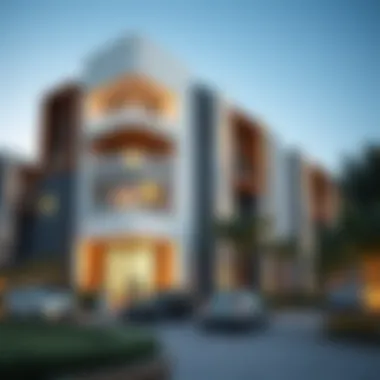
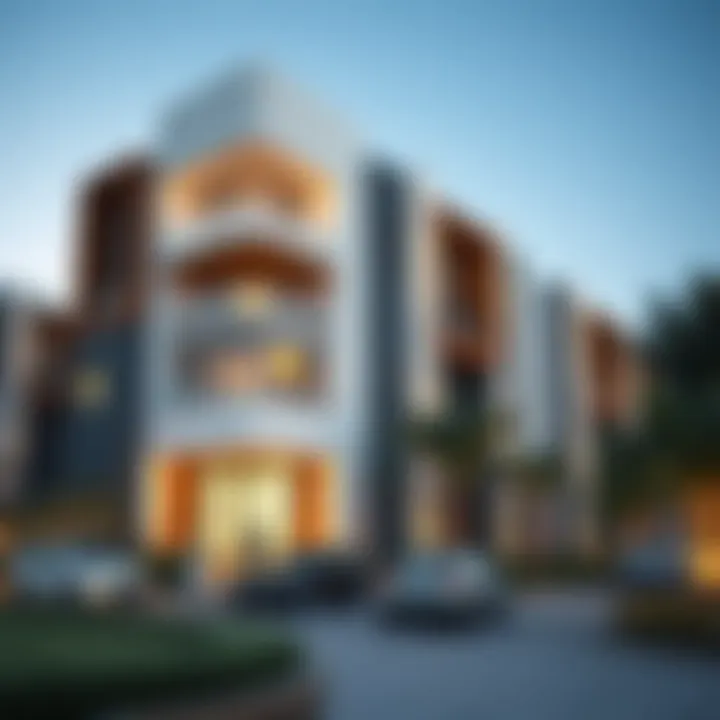
Healthcare is a crucial pillar in any community, and in the case of Sharjah, the focus on health services reflects the emirate's growth and commitment to enhancing the quality of life for its residents. With a diverse population demanding a range of healthcare services, understanding the facilities available is essential for both potential homeowners and investors. Moreover, a robust healthcare system can significantly impact property values, attracting families and professionals seeking a healthier environment.
Public Healthcare System
The public healthcare system in Sharjah provides critical services to the populace, ensuring that healthcare is accessible to all. The Sharjah Health Authority oversees public health services, which include hospitals, clinics, and specialized medical centers. These facilities are essential for providing primary care as well as emergency services.
- Hospitals: Some significant public hospitals include Al Qassimi Hospital and Sharjah University Hospital, both offering various services from emergency care to specialized treatments.
- Clinics: Numerous clinics across Sharjah offer outpatient services, dental care, and general medical consultations, ensuring that residents can easily access basic healthcare.
Every resident has a right to healthcare, and the UAE government’s commitment shows through the continually updated services provided in these public facilities. Practically speaking, this puts less burden on families when it comes to medical costs. Thus, homebuyers will find reassurance knowing that their health needs can be met without breaking the bank.
Private Healthcare Options
In addition to public services, there is a bustling network of private healthcare facilities in Sharjah that caters to both local and expatriate residents. These private clinics and hospitals often provide enhanced services, quicker appointment times, and specialized treatments tailored to individual needs.
- Leading Private Institutions: Institutions like NMC Hospital and Lifeline Hospital are recognized for their high-quality medical services and advanced technology. These facilities often have shorter wait times and are staffed by highly qualified professionals.
- Specialized Care: Many private providers focus on specific fields, like fertility clinics or cosmetic surgery. For those seeking specialized care, these options are invaluable.
While the costs associated with private healthcare can be higher, many residents prefer the conveniences they offer. Investors should recognize that proximity to these facilities is often a selling point in the real estate market. Families, in particular, appreciate the flexibility that private healthcare offers when it comes to scheduling and the range of services available.
Future Development Projects
Future development projects in Sharjah represent a significant facet of the emirate's growth strategy, shaping its urban fabric and economic prospects. With a well-thought-out roadmap, these initiatives are essential for various reasons, including catering to the anticipated population increase, attracting foreign investment, and making Sharjah a livable and business-friendly destination.
Urban Development Plans
Urban development plans in Sharjah are a reflection of the emirate's vision for modernization. The focus lies on integrating contemporary architecture with cultural nuances, ensuring that every new structure echoes the historical significance of the region.
For instance, the Sharjah Urban Planning Council has laid out comprehensive strategies to enhance residential areas, commercial hubs, and public spaces. This includes the refurbishment of existing neighborhoods to better accommodate families and professionals alike. The projects aim to foster community interaction, creating a vibrant atmosphere that encourages both locals and visitors.
Moreover, the integration of mixed-use buildings is becoming a reality. These developments are designed to house residential apartments above retail spaces, promoting convenience and sustainability. This not only enhances property value but also spurs local economic activity.
Key highlights of the urban development plans include:
- Smart infrastructure that focuses on connectivity and ease of movement.
- Public parks and green spaces, which are crucial given the region's environmental context.
- Enhanced public transport options, including tram lines that aim to connect key areas efficiently.
These planned enhancements focus not only on aesthetics but also on practicality, ensuring the emirate remains competitive as a hub for living and commerce.
Sustainability Initiatives
Sustainability is firmly at the heart of Sharjah's development initiatives. Recognizing the pressing challenges related to environmental degradation and resource management, the emirate has embarked on a mission to integrate sustainable practices into its growth policies.
One of the critical initiatives is the Sharjah Sustainability Strategy, which emphasizes responsible construction practices and renewable energy sources. Developers are increasingly encouraged to adopt green building standards, ensuring that new projects comply with environmental regulations aimed at reducing carbon footprints.
Several initiatives that illustrate Sharjah's commitment to sustainability include:
- Water conservation systems that aim to utilize treated wastewater for irrigation.
- Solar energy projects, like the installation of photovoltaic panels on public buildings, reducing dependency on fossil fuels.
- Waste management systems that promote recycling and minimize landfill use.
These moves not only enhance Sharjah’s global standing but also ensure that its natural beauty and resources are preserved for future generations, ultimately bolstering its appeal to environmentally conscious investors.
In a rapidly changing world, Sharjah's future development projects embody an evolving vision—one that balances growth with sustainability, making it a beacon of innovation in the region.
For more information on sustainability in urban development, check the Sharjah Urban Planning Council or explore the broader implications on environmental standards in env.gov.ae.
Through thoughtful planning and commitment to sustainability, Sharjah is poised to forge ahead, offering a nurturing environment for both residents and businesses.
Challenges Facing the Emirate
The Emirate of Sharjah, despite its rich cultural tapestry and economic potential, grapples with a series of intricate challenges that can significantly impact its future. Understanding these challenges is essential for stakeholders including investors, residents, and policymakers. Highlighting specific economic and environmental pressures reveals insights into the emirate's resilience and adaptability. Addressing these challenges not only fosters sustainable development but also enhances the living experience within Sharjah, making it more attractive for prospective investors and homebuyers.
Economic Pressures
Sharjah's economy, while diverse, is not without its pressures. The emirate relies heavily on key sectors such as tourism and manufacturing, which can be sensitive to global economic trends. A downturn in the global economy or geopolitical tensions in the region can lead to reduced investment and spending, impacting local businesses.
- Dependence on Oil Prices: Despite efforts to diversify, fluctuating oil prices continue to influence Sharjah’s financial stability. A sharp decline in oil revenue can strain budgets and lead to cuts in public spending, which can indirectly affect housing markets and business ventures.
- Real Estate Market Volatility: Recent years have seen significant fluctuations in real estate prices. If prices drop too drastically, it could deter potential investors, slowing further growth. Investors need to tread carefully to assess the market dynamics accurately.
- Competition from Neighboring Emirates: Sharjah finds itself in competition with neighboring emirates, like Dubai and Abu Dhabi, which often attract a larger share of investment and tourism. Investors looking for favorable returns may be swayed by the more aggressive development in these regions.
These economic pressures necessitate a strategic approach, encouraging small and medium-sized enterprises to bolster the local economy and create a more balanced financial framework that can withstand external shocks.
Environmental Concerns
As Sharjah continues to rapidly develop, environmental concerns have taken center stage in discussions about sustainability and quality of life. Balancing rapid growth with environmental awareness is a tightrope walk for local authorities.
- Water Scarcity: Being in a desert environment, Sharjah faces ongoing challenges related to water scarcity. The demand for water, particularly in construction and landscaping, is on the rise, necessitating innovations in water conservation and management.
- Pollution and Urbanization: Rapid urbanization can lead to increased pollution levels, affecting air and water quality. This is particularly critical to residents’ health. Effective waste management and pollution control measures need to be instituted to safeguard the emirate's ecological balance.
- Climate Change Adaptations: With changing global climates, Sharjah must equip itself to handle potential impacts like heatwaves and extreme weather events. Policies that reflect sustainable practices can not only cushion the effects of climate change but also attract environmentally conscious investors and residents.
"Addressing these challenges requires a proactive agenda focused on innovation, community engagement, and environmental stewardship to secure a thriving future for Sharjah."
Tackling these economic and environmental challenges head-on is crucial for Sharjah to strengthen its position within the United Arab Emirates as a desirable location for investment and living. By fostering resilience through strategic planning and sustainable practices, Sharjah can continue to flourish while preserving its unique character and heritage.
Ending and Recommendations
As we draw the curtain on our exploration of the Emirate of Sharjah, it’s imperative to recognize the nuanced layers that define this vibrant region. The conclusion serves as a watershed moment, bringing together the various threads of culture, history, demographics, and socio-economic prospects we've dissected throughout this article. In a landscape that is so dynamically evolving, understanding Sharjah's unique characteristics and challenges offers a roadmap for potential investors, residents, and stakeholders alike.
Summarizing Key Insights
Sharjah boasts a rich, cultural tapestry woven with threads of tradition juxtaposed against modernity. As the third-largest emirate in the UAE, Sharjah's strategic coastal positioning along the Arabian Gulf and its access to major trade routes significantly influence its economic activities.
- Cultural Hub: Its commitment to arts and education creates a nurturing environment for cultural development, distinct from other emirates. The emirate is renowned for its museums, galleries, and emphasis on heritage preservation.
- Diverse Economy: The economic landscape showcases key sectors such as manufacturing, tourism, and logistics, further bolstered by government initiatives to attract foreign investment.
- Real Estate Opportunities: Sharjah's real estate market provides a diverse range of options, from affordable housing to luxury developments, appealing to varying socio-economic groups.
- Future Growth Potential: With numerous urban development and sustainability initiatives, the emirate is positioning itself for continued growth, making it an attractive option for investors looking for long-term returns.
"Understanding the multifaceted dynamics of Sharjah now can lead to informed decisions tomorrow."
Advice for Potential Investors
For those considering a stake in Sharjah, a few key considerations can guide your journey. Firstly, familiarize yourself with the legal framework surrounding real estate investment in the emirate. Here are some pointers that could serve as a solid foundation:
- Local Market Trends: Keep abreast of the local real estate market dynamics. Consult with local real estate agencies or professionals familiar with current market trends to understand pricing and demand.
- Regulatory Landscape: Be aware of ownership laws, particularly for foreign investors. Understanding procedural nuances can ease the process significantly.
- Networking: Establish connections with local business communities. Engaging with other investors or attending local exhibitions can provide invaluable insights and potential partnerships.
- Explore Diversified Investments: Don’t just focus on one sector. Sharjah’s economy is broad-based, and diversifying your investments can mitigate risks and enhance potential returns.
- Consider Sustainability Initiatives: Invest in projects aligned with sustainability efforts. These often have long-term benefits both financially and for the community.
In summary, the Emirate of Sharjah not only stands as a key player within the UAE but also presents a myriad of opportunities for savvy investors willing to navigate its landscape.
For more information on investing in the UAE, you can refer to these resources:





